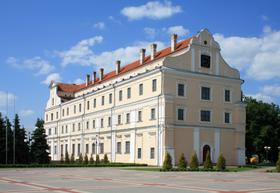In What is AP?, we looked at the organization that has created one of the world's most popular college prep programs. This companion article will look at the other college preparatory program known as IB. The organization behind the IB program, the International Baccalaureate Organization, was founded in 1968. With its headquarters in Geneva, Switzerland, the IB Organization serves over 1.3 million students in 147 countries.
What is the IB?
Most people think of the IB or International Baccalaureate as the organization which sponsors the highly-regarded college preparatory IB Diploma Programme. Indeed the IB Diploma is where it all started. The IB Diploma is the college preparatory component of a curriculum that begins early childhood and ends with pre-college and pre-career programs.
The International Baccalaureate Organization has grown into four programs: Primary Years, Middle Years, Diploma, and IB Career-related Programmes. This, then, is one of the major differences with Advanced Placement. Practically speaking, Advanced Placement encompasses only the college preparatory years in the academic continuum, although it now offers a Pre-AP designed to encourage students. The IB Organization offers programs that begin with 3-year-olds and end with college preparatory and career-related diplomas.
The IB Diploma Programme
Since you are interested in finding out the similarities and differences between the two top college prep academic programs, let's look under the hood of the IB Diploma Programme and find out what's involved. Essentially the IB Diploma Programme is a two-year course of study for high school students aged 16-19. Its own curriculum is quite distinct from the more universal Advanced Placement coursework most prep schools offer. Like AP, the IB Programme leads to external examinations, success in which one can earn a diploma widely recognized by universities and colleges worldwide. As with the AP, the IB Diploma shows college admissions professionals that a student has attained a certain standard, as evidenced by earning the IB Diploma. admissions professionals know what IB on a transcript implies and entails, just as they do when they see AP on a transcript.
What Are The Differences Between IB and AP?
IB as a complete package. It is curriculum and coursework taught to universal IB standards. The International Baccalaureate Organisation authorizes schools to offer its programs. You don't just hang a sign saying you are an IB school. The authorization process, in many ways, reminds me of most schools' accreditation processes. It is very detailed and exhaustive. Schools must not undergo such a rigorous process to teach AP courses.
As well the faculty have to undergo a thorough preparation for teaching the IB programs. The Diploma coursework culminates in external examinations set by and scored by the IB organization. In contrast, Advanced Placement courses are only offered at the high school level. Think of Advanced Placement courses as an enhancement of a school's college preparatory curriculum. On the other hand, the IB Diploma Programme can only be offered by schools authorized as IB World Schools. While students can take individual IB Diploma courses, much like Advanced Placement courses, they are encouraged to attempt the full IB Diploma and all it entails.
The IB Diploma Programme requires students to write extensively. One of the components of the senior year is a major - 4000 word - extended essay. The IB examinations require written answers instead of multiple-choice questions, which comprise about half of most AP examinations. This emphasis on writing aligns with most private schools' educational philosophy, i.e., writing proficiency is an expected outcome.
The overarching philosophy of the International Baccalaureate is its global emphasis and focus. The IBO seeks to educate children to be citizens of the world with an awareness and understanding of the diversity of people worldwide. IB schools undertake to "develop and promote international-mindedness."
Other differences include the fact that IB schools promote learning foreign languages. And you cannot take IB courses online or if you are not in 11th or 12th grades. You can take AP courses online and at any age.
Another basic difference between the two programs is that Advanced Placement courses are offered in approximately 60% of American secondary schools. There are roughly 35,000 public and private high schools. By contrast, there are about 800 IB schools in the United States
Think of AP or Advanced Placement as an add-on to your school's course offerings. The difference is that at the end of an AP course, students are examined in a national examination instead of a local one.
What Do IB and AP Have In Common?
IB and AP are all about excellence and high standards. Any prep school which offers IB or AP is making a statement. They are investing enormous amounts of effort and resources into achieving the best possible standards of teaching for their students. The result hoped for is a class of graduates ready for university-level studies.
Both the AP and IB programs are only as good as their teachers. Well-qualified, experienced teachers will make any subject come alive. However, at the college preparatory excellent teaching can make a difference between the best and satisfactory achievements.
Both the AP and IB programs offer rigorous academic work. That is why college admissions professionals value AP and IB on academic transcripts. They know that the applicant has put forth some serious academic effort. They know the applicant has taken the most demanding courses his school offers.
Conclusion
Advanced Placement and International Baccalaureate courses are synonymous with a high standard of academic work at the pre-college level. Both AP and IB use external examinations to ensure the credibility of students' results. Both organizations have internal review and assessment programs and procedures to maintain the highest academic standards. Explore Advanced Placement and International Baccalaureate in detail. Read all you can about the two approaches to rigorous college preparation. Visit schools that offer these programs. Ask a lot of questions. Then make an informed decision based on which organization bests suits your needs and requirements.
Questions? Contact us on Facebook. @privateschoolreview















